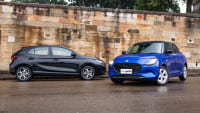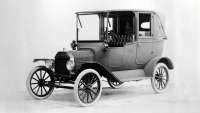Grey nomads are a very clever mob. And you’d certainly hope that’s the case because grey nomads – defined as “Australians over 55 years old who travel for an extended time — from weeks to months — and cover more than 300 kilometres in a day across semi-arid and coastal Australia”* – are, by their very nature, experienced at life and its many challenges and, hopefully, they are wiser versions of the rest of us. (* That’s according to abc.net.au, and who am I to argue with them?)
Grey nomads seek comfort and functionality in their vehicles and their moveable accommodation (camper-trailer/caravan etc), but, perhaps even more than the rest of us, they like getting absolute value for money from those things, and during their travels.
They’re not shy of spending top dollar on their camper-trailer/caravan at purchase time, but they’ll want it to be as close to perfect for them and their lifestyle as is possible from the get-go.
Any flaws or niggles – perceived or otherwise – will be discovered and addressed as needed while grey nomads are on the move.
We’ve already tackled the best grey nomad vehicles, but what vehicle-based accommodation options do grey nomads favour? They’re out there towing and camping and frequenting caravan parks, so let’s check out what we reckon are the top three.
Camper-trailers
A camper-trailer provides a gateway of sorts for anyone, not just grey nomads, into the world of vehicle-based adventure travel. In its most basic form a camper-trailer is simply a trailer with a built-in tent and storage space.
As you’d imagine, there are many different types of camper-trailers across many price-points, stretching from basic no-frills but very popular sub-$10,000 new models (such as Australian-made campers from Brisbane-based Walkabout Campers), to top-quality new $30,000 campers (such as Aussie-made Cub Campers’ products), through to fully kitted-out new campers that each seem to pack everything you’d ever need into one $50,000 (and up) package (such as something from Aussie company Patriot Campers).

Camper-trailers are available in many different formats, including soft-floor, hard-floor, rear-fold camper, forward-fold and pop-top. (The names are kind of self-explanatory, but for more specific explanations read our Advice yarns and camper reviews in the Adventure section of carsguide-com.au.)
They may have ample storage, a slide-out stove, a sink and much more. Different layouts and design mean there are different set-up and stow-away processes for campers.
A soft-floor camper has a bit more all-round flexibility for the user, in terms of available storage space, but there are always ways around any problem – again, perceived or otherwise.
As with anything, design, materials, ease of use, build quality and engineering vary, depending on pricing and on the manufacturer. Do your research and remember: just because something is cheap as chips doesn’t mean it’s good value, or that it is better suited to your travels, your plans and your lifestyle.

Also, if you plan to take your camper off-road make sure, before you buy it, that it’s actually built for such a purpose – with a robust structure, and good off-road tyres and suspension as standard – rather than simply believing some over-exaggerated sale hype. (Sometimes “off-road” in camper-trailer and caravan parlance means “a well-maintained gravel track in dry weather”.)
Keep in mind too that the weight of a camper-trailer can range from less than 500kg, through to 1500kg, depending on how much gear it has as standard, how many add-ons you get for it, and how robust its chassis is.
New and used camper-trailers for sale can be found on-line and in the real world, But, be warned, at time of writing, demand far outweighed supply because of everyone’s eagerness to get out and about and buy up most of the exisiting camper-trailer stock, after being locked down due to covid restrictions. And remember to read the warranty and the fine print.
Caravans
Caravans have come a long, long way since your family towed an old Viscount or Millard to and from your mob’s favourite caravan park. Compared to those basic-as-can-be caravans, contemporary examples are more like space shuttles. At the very least, a modern-day caravan has a comfy double bed, a kitchen, a lounge area, a shower and a toilet. Bigger caravans have more amenities onboard, but a bigger caravan also means that there’ll be more towing-related stress on your vehicle.
In broad terms, caravans are either of the normal caravan variety (exactly what you imagine it to be), or a pop-top-style caravan which, as the name implies, has a top (or roof) that you raise, or pop up, when you’re at camp to give you more room inside, and is then lowered, closed and secured when it’s time to tow it.
If you intend to go off-road in your caravan, follow the same process as you would for a camper-trailer: check that it’s a purpose-built off-roader with a tough chassis, as well as decent off-road tyres and suspension as standard.

The bonus of a caravan is that you have pretty much everything you need right there in the ’van – it’s an all-in-one travelling entity – so all you need to do is find a campsite with a great view and pull up for a night – or more.
Negatives include the sizeable initial outlay if you spend big and the fact a caravan adds another layer of complexity – and potential strife – to your travels.

Also, worth noting is the fact a caravan can range in weight from 1500kg to 3000kg or so.
Caravan prices range from $15,000 for a (very) used caravan through to more than $100,000 for a brand-new behemoth with the works.
Campervans and motorhomes
Some might regard the campervan or motorhome as the perfect mobile-accommodation solution for those who want to go camping and adventuring but they don’t want to tow anything, or they don’t want to have to set up anything when they arrive at their campsite of choice for the night. At the end of a long day’s driving sometimes the easy way (no setting up) is the best way.
A campervan or motorhome is just that: vehicle-based accommodation built into the vehicle itself. In basic terms, an example – perhaps a classic VW Kombi, or a modified Volkswagen Transporter or Toyota Hiace – will have a bed, minor storage spaces, a simple kitchen, onboard power and more incorporated into the vehicle’s interior. Awnings and more can make the van more versatile, in terms of campsite set-up.
Bigger versions of these – such as a ready-made Jayco Campervan or a modified Mercedes-Benz Sprinter, a robust Iveco Daily 4x4 or even the more-than US$250,000 Mitsubishi Fuso-based EarthCruiser EXP 2020 overland vehicle (Google it) – will have those features mentioned above, but will also add, at the very least, a toilet and shower, more kitchen features, aircon, more extensive plumbing, water tanks (plus grey water), and much more. They more closely resemble a house on wheels, than a vehicle.
_0.jpg)
Price: For a small campervan, expect to pay $12,500 for a 1999 Hiace camper van that has almost 250,000km on the odo, and anywhere up to $150,000 for a brand-new highly-modified campervan.
Expect to pay anywhere from $50,000 for a 2007 VW Crafter (with a 170,000km on the odo), and, for a much larger, heftier and comprehensively-equipped motorhome-style set-up, prepare to pay more than $130,000 for a new motorhome.
Sydney company Trakka, which, it states, has been “designing, manufacturing and selling luxury campervans and motorhomes in Sydney since 1973”, is well-known and -regarded in the Australian market for producing top-quality examples of these types of vehicles. For an idea of Trakka pricing, its six-metre-long adventure-ready Akuna A2M, which has permanent standing height, full bathroom module (with electric stow-away sliding toilet to provide extra showering space) and more defined separate sleeping/cooking/living areas costs from $150,000 drive-away.
.jpg)
For more details and hints and tips on what vehicle and vehicle-based accommodation might be best for you, read our advice yarns here in the Adventure section of carsguide.com.au, as well as our comprehensive reviews.







.jpg)
.jpg)



.jpg)
.jpg)

.jpg)


.jpg)





